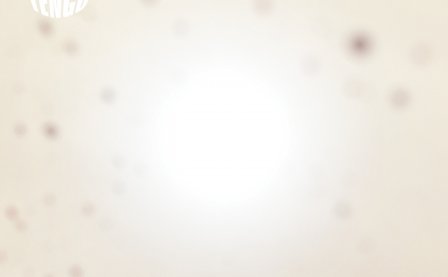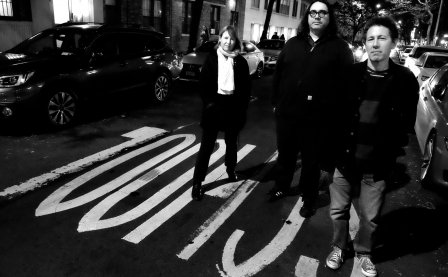I’ve always thought of the early music of Yo La Tengo as the sonic equivalent of comfort food. “Crispy Duck,” “Hot Chicken,” New Wave Hot Dogs — if the band wasn’t actually singing about greasy roadside dining, they were always at least making music about the cheap pleasures of pop. Pummeled drums, fuzzed-out guitars, ethereal pop harmonics, with a sound so deeply ingrained in the sonic imaginary of a slack generation that each new anti-anthem felt like coming home again. Their music was wistful, melancholic, but never dark. Even in a minor key, their melodies were marked by a certain eagerness, an anticipation. Each song had already seemed to solve its own problem, to provide its own fix. In fact, that’s all the band was: a fix. You’d slip into “Blue Line Swinger” like your best pair of jeans. You’d reach for “Tom Courteney” like you’d reach for a cool drink and then just as soon forget you were drinking it. Drug addiction is not the appropriate metaphor. The band played Velvet Underground-styled drone rock, but without any of the smut or sleaze. (A friend once dismissed the band by saying, “They just sound like whiteness to me.”) Their obviousness, in fact, put them much closer to The Modern Lovers, a band that delivered all of their irony with earnestness. Sure, Yo La Tengo’s feedback was anxious, and their repetitiveness kept you on the hook, but their sound as a whole was warm and vaporous. The music was designed to soothe and satisfy their otherwise unsure listeners.
And, then, suddenly, they turned on the charm. For most fans, the group hit their stride in the late 1990s, with a set of albums dedicated to the pleasures of domestic intimacy and the enchantment of everyday life. Set with a new lounge-y ease, I Can Hear the Heart Beating As One showcased a group that was growing up and mellowing out, only slightly startled to find themselves happy with age and eager to share their joy. Its companion piece, And Then Nothing Turned Itself Inside-Out, proved even more personal, the music slowing down to probe the insecurities and satisfactions of adulthood in ways that seemed, to many, a veritable indie guidebook for growing old with grace. Indeed, the Yo La Tengo message boards are full of stories attesting to the generational power of these two albums: there are hordes of fans who lost their virginity to “Autumn Sweater” and got married to “Tears Are In Your Eyes ” and then birthed new fans while listening to “Night Falls on Hoboken.” Reviewers, too, can’t resist the band’s domestic charm. Like the Carters before them, Yo La Tengo have been anointed the “first family” of indie music. Ira has been deemed “the father of indie rock,” while Georgia is praised for her “maternal” vocals; James might as well be a big happy baby just lucky to have been born into such a blessed arrangement. The group’s reputation has hardly suffered from the series of slightly less satisfying albums that followed in the last decade, such as the tepid Summer Sun and the messy pastiche of Popular Songs. If the group’s record collection tendencies get the better of them, their sound has only grown more masterful, more expansive with age, emerging from the feedback and distortion of the early work as a masterful, clear-eyed blend of 50s doo-wop, 60s garage, psych-folk, electronica, soundtrack music, and lounge. Song by song, it seems, their instincts remain spot on, and, more often than not, you’ll get your fix.
All of which is to say that there’s nothing really surprising about the excellence of their new album, Fade, except that I’m completely surprised by how excellent it is. It’s perhaps not as immediately satisfying as their early work and not nearly as charming as their intimate mid-career efforts, but, after several careful listens, the album feels as powerful and urgent as anything else in their discography. In fact, I am not at all exaggerating in saying that this is an album that made me feel care and tenderness and even something like love. Fade reveals the group taking a deeply existential turn, but only as a way of highlighting moments of grace that turn out to be both deeply personal and explicitly musical. The album is framed by two fuzzed-out anthems dedicated to the theme of persistence, while the smaller-scaled, but no less inspiring, tracks in between detail a set of more intimate struggles to maintain commitment and trust. “Stupid Things” opens with a bit of wistful noodling and slowly, with a motorik beat and a chugging bass drone, builds towards an obsessive groove. Ira whispers his way into the mix, counting all the ways that love seems to slip away until he’s struck, at the chorus, with the full force of love again. “And I say, ‘Whoa’…,” he sings, and the whole song just seems to blossom, gorgeously, with synths and strings. It’s hard to hear this moment and not fall in love with Ira — not with him, I guess, but alongside him, to share his love — even as the beat returns and propels you away again toward regret and misgiving. Fade doesn’t just suggest, but demonstrates — musically — that this loss and this love are one and the same. Its existential logic is stitched into its very form, lacing every rhythmic shuffle, every fleeting guitar doodle, every ethereal “do do do.” You can feel it even in the exquisite shortness of its songs and its unbearably short running length. In fact, you’d think the band was cheating you, with this relatively brisk and brief outing, if they didn’t also prove that life’s cheating is also its beauty.
When I say “existential,” I mean it. The questions and fears that animate Fade are the very same questions and fears raised by Karl Jaspers in 1932:
I do not begin at the beginning when I ask questions such as “What is being?” or “Why is anything at all? Why not nothing?” or “Who am I?” or “What do I really want?” These questions arise from a situation in which, coming from a past, I find myself.
When I become aware of myself I see that I am in a world in which I take my bearings. Previously I had taken things up and dropped them again; everything had been a matter of course, unquestioned, and purely present; but now I wonder and ask myself what really is. For all things pass away, and I was not at the beginning, nor am I at the end. Even between beginning and end I ask about the beginning and the end.
I would like an answer that will give me support. For though I can neither fully grasp my situation nor see through to its origin, the sense of it oppresses me with a vague fear.
Such musings might not seem like hearty inspiration for indie rock jamming, but the beauty of Fade lies in its ability to tackle this crisis, the crisis of fading, and turn it into a thing of musical joy. The album opens with a dark anthem, “Ohm,” a song about passing that presents its own passing as a kind of “support.” The song seems oddly manic and meditative, agitated and slack, but in time, this doubleness comes across less like confusion and more like its own kind of philosophizing, a way of confronting an otherwise unbearable situation. Here, singing about loss and change becomes its own compelling antidote to loss and change:
But if nothing ever stays the same
Nothing’s explained
The higher we go, the longer we fly
Cos this is it for all we know
So say good night to me
And lose no more time, no time
Resisting the flow
Slowly, the chant, which sounds like the chanting of a sports arena heard from afar, builds in energy and power, pulling everything into its wake, negating its own negation, so that even the phrase “resisting the flow,” repeated over and over, turns into its opposite. The motion of sound, however anxious and fretful, becomes its own solution, its very emptiness — “this is it” — providing its own kind of release, its “flow.” Similarly, the title of the song — “Ohm” — blends the technological and the spiritual. The very emptiness and meaninglessness of the electrical unit used in amp technology (literally, the measurement of “resisting the flow” of electricity) becomes the basis of transcendent musical experience, and so when Ira finally lets loose with a soaring feedback-laced solo, you forget that there was ever any problem at all.
But this dynamic marks every song on the album, which comes across less like a philosophical treatise and more like a series of intimate “situations,” each of which, with its everyday fear and anxiety, produces its own momentary “support.” “Is That Enough” addresses feelings of inadequacy with 1950s Frankie Avalon string schmaltz and a little country twang. “Paddle Forward” confronts the fear of risk with bursts of classic indie feedback that feel as fresh as the salt sea spray — “Hang on tight/ The water’s fine.” “I’ll Be Around” tackles blindness and doubt with gently fingerpicked psych-folk and a gorgeous Mellotron hum (the song features a “kaleidoscope girl in the doorway” and a mysterious raga solo at the end). Throughout the album, big existential questions meet with little sonic solutions, but its philosophical framework breathes new life and urgency into these well-used forms. Spiked with doubt and fear, cheap pop has rarely ever sounded so necessary, so dire. In fact, here, 30 years on, the album seems to shed light on the group’s entire output, making even those early easy toss-offs seem like the stuff of existential grace.
Given these years, perhaps, it’s easy to imagine that these breakthroughs and affirmations emerge only from the romance shared by Ira and Georgia. These are all essentially love songs, but each one fleshes out its clichés with what seems to be a hard-won and deeply felt sense of faith. I’m most amazed, though, by the generosity with which this tenderness is extended to the listener; these songs each pull the old soul trick of blurring lover and listener, and in this, they greatly widen their circle of wonder and warmth. On “Cornelia and Jane,” the best of the bunch, Georgia sings to a troubled, unreachable child, but the refrain, with its breathy rise up the scale, seems to shed its care on the listener, too: “How can we care for you?/ How can we hold on to you?” It’s a sad and wonderful and utterly devastating moment. In the next song, a hushed little ode to rainy-day apathy, Ira asks, “What are you going to do?” and then, in the next, with its jaunty strum, he wonders, “Maybe that’s okay, if we’re not so strong.” Here, with these humdrum hymns, the rushed listener might think that the album bottoms out, falling into a low, depressive register, but each of these questions is offered up earnestly, with genuine interest and regard. Together, they perform a kind of musical therapy, demonstrating exactly what it means to care and what it means to be cared for. And then the last track, “Before We Run,” with its magisterial orchestral arrangement — proud horns and eager strings — returns to affirm it all. There’s a power in this music to carry the listener “beyond mistrust” to a place where people say what they mean and keep their promises. And there’s a power in this band to persist, still, nearly 30 years later, and probably to persist too in our ears long after they fade for good.
More about: Yo La Tengo




